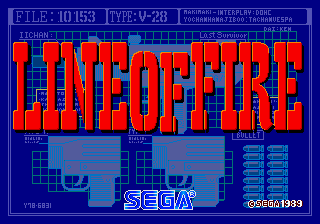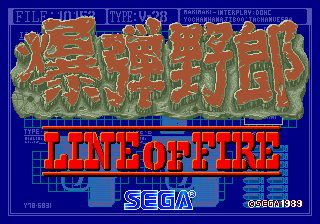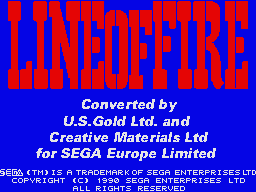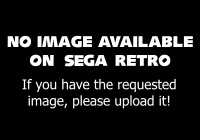Difference between revisions of "Line of Fire"
From Sega Retro
Hyperspeed34 (talk | contribs) |
|||
| (53 intermediate revisions by 8 users not shown) | |||
| Line 1: | Line 1: | ||
| − | {{ | + | {{otherPage|desc=the redesigned [[Sega Master System]] port|page=Line of Fire (Master System)}} |
{{Bob | {{Bob | ||
| bobscreen=LineofFire title.png | | bobscreen=LineofFire title.png | ||
| − | | publisher=[[Sega]] | + | | bobscreen2=LineofFire XBoard JP Title.png |
| − | | developer=[[Sega]] | + | | bobscreen3=Notavailable.svg |
| − | | system=[[Sega X Board]], Amiga, Amstrad CPC, Atari ST, Commodore 64, ZX Spectrum | + | | bobscreen4=LineofFire CPC Title.png |
| − | + | | bobscreen5=Notavailable.svg | |
| + | | bobscreen6=Notavailable.svg | ||
| + | | bobscreen7=LineofFire Spectrum Title.png | ||
| + | | tab1=X Board | ||
| + | | tab2=X Board (JP) | ||
| + | | tab3=Amiga | ||
| + | | tab4=Amstrad CPC | ||
| + | | tab5=Atari ST | ||
| + | | tab6=Commodore 64 | ||
| + | | tab7=ZX Spectrum | ||
| + | | publisher={{company|[[Sega Enterprises, Ltd.]]|system=XBD}} | ||
| + | {{company|[[U.S. Gold]]|system=Amiga,CPC,ST,C64,Spectrum}} | ||
| + | | developer={{company|[[Sega R&D 1]]|system=XBD}} | ||
| + | {{company|[[Creative Materials]]|system=Amiga,CPC,ST,Spectrum}} | ||
| + | {{company|[[Tiertex]]|system=Amiga}} | ||
| + | | system=[[Sega X Board]], [[Amiga]], [[Amstrad CPC]], [[Atari ST]], [[Commodore 64]], [[ZX Spectrum]] | ||
| sounddriver= | | sounddriver= | ||
| peripherals= | | peripherals= | ||
| − | | players=1 | + | | players=1-2 |
| genre=Shoot-'em-Up | | genre=Shoot-'em-Up | ||
| − | | releases={{ | + | | releases={{releasesArcade |
| − | | | + | | xbd_date_jp=1989-12{{fileref|Sega Arcade History JP EnterBrain Book-1.pdf|page=101}} |
| − | + | | xbd_date_us=1989 | |
| + | | xbd_date_au=19xx | ||
}} | }} | ||
{{releasesHC | {{releasesHC | ||
| amiga_date_uk=1991-01 | | amiga_date_uk=1991-01 | ||
| − | | amiga_rrp_uk=24.99{{ | + | | amiga_rrp_uk=24.99{{magref|ace|40|55}} |
| st_date_uk=1991-01 | | st_date_uk=1991-01 | ||
| − | | st_rrp_uk=24.99{{ | + | | st_rrp_uk=24.99{{magref|ace|40|55}} |
| − | | cpc_date_uk_c=1990-12{{ | + | | cpc_date_uk_c=1990-12{{magref|cvg|109|167}} |
| − | | cpc_rrp_uk_c=10.99{{ | + | | cpc_rrp_uk_c=10.99{{magref|cvg|109|167}} |
| − | | cpc_date_uk_d=1990-12{{ | + | | cpc_date_uk_d=1990-12{{magref|cvg|109|167}} |
| − | | cpc_rrp_uk_d=14.99{{ | + | | cpc_rrp_uk_d=14.99{{magref|cvg|109|167}} |
| cpc_date_es_c=1990 | | cpc_date_es_c=1990 | ||
| cpc_date_es_d=1990 | | cpc_date_es_d=1990 | ||
| − | | c64_date_uk_c=1990-12{{ | + | | c64_date_uk_c=1990-12{{magref|cvg|109|167}} |
| − | | c64_rrp_uk_c=10.99{{ | + | | c64_rrp_uk_c=10.99{{magref|cvg|109|167}} |
| − | | spectrum_date_uk_c=1990-12{{ | + | | spectrum_date_uk_c=1990-12{{magref|cvg|109|167}} |
| − | | spectrum_rrp_uk_c=10.99{{ | + | | spectrum_rrp_uk_c=10.99{{magref|cvg|109|167}} |
| spectrum_date_es_c=1990 | | spectrum_date_es_c=1990 | ||
}} | }} | ||
}} | }} | ||
| − | ''''' | + | {{sub-stub}}'''''{{PAGENAME}}''''' (ライン・オブ・ファイヤー), or sometimes called '''''Line of Fire: Bakudan Yarou''''' (ライン・オブ・ファイヤー 爆弾野郎) in Japan, is a [[Sega X Board]] arcade light gun game developed by [[Sega R&D 1]] and manufactured by [[Sega Enterprises, Ltd.]] First released to Japanese and American arcades in December 1989{{fileref|Sega Arcade History JP EnterBrain Book-1.pdf|page=101}}, the game notably uses sprite scaling to simulate three-dimensional scenery, and saw contemporary ports to a number of personal computers. |
| − | + | One year later, ''Line of Fire'' was significantly redesigned and ported to the [[Sega Master System]] as the titular ''[[Line of Fire (Master System)|Line of Fire]]''. | |
| − | The | + | ==Gameplay== |
| + | ===Missions=== | ||
| + | {{InfoTable|imagewidths=200| | ||
| + | {{InfoRow | ||
| + | | title=Mission 1 | ||
| + | | screenshot=Notavailable.svg | ||
| + | | desc=''Capture the powerful machine gun unit from the enemy base!'' | ||
| + | }} | ||
| + | {{InfoRow | ||
| + | | title=Mission 2 | ||
| + | | screenshot=Notavailable.svg | ||
| + | | desc=''Destroy the enemy jungle base.'' | ||
| + | }} | ||
| + | {{InfoRow | ||
| + | | title=Mission 3 | ||
| + | | screenshot=Notavailable.svg | ||
| + | | desc=''Escape by high-speed boat.'' | ||
| + | }} | ||
| + | {{InfoRow | ||
| + | | title=Mission 4 | ||
| + | | screenshot=Notavailable.svg | ||
| + | | desc=''Fighting in the canyon.'' | ||
| + | }} | ||
| + | {{InfoRow | ||
| + | | title=Mission 5 | ||
| + | | screenshot=Notavailable.svg | ||
| + | | desc=''Do or die battle in the desert.'' | ||
| + | }} | ||
| + | {{InfoRow | ||
| + | | title=Mission 6 | ||
| + | | screenshot=Notavailable.svg | ||
| + | | desc=''Foes await in the city's ruins.'' | ||
| + | }} | ||
| + | {{InfoRow | ||
| + | | title=Mission 7 | ||
| + | | screenshot=Notavailable.svg | ||
| + | | desc=''Escape the enemies by aircraft.'' | ||
| + | }} | ||
| + | {{InfoRow | ||
| + | | title=Mission 8 | ||
| + | | screenshot=Notavailable.svg | ||
| + | | desc=''Fly to your base by helicopter.'' | ||
| + | }} | ||
| + | }} | ||
| + | |||
| + | ==Story== | ||
| + | In the game, you play as two escaping POWs who were captured after seizing a "secret machine gun unit" from the enemy. | ||
| + | |||
| + | ==Versions== | ||
| + | Unlike most other Sega arcade conversions of the time, the Amiga and Atari ST versions feature some degree of software-based sprite scaling, although sprite limits meant this could not be implemented for the background of the first stage{{magref|zero|14|19}}. To compensate, the number of on-screen enemies is reduced over the arcade, and several enemy types had to be removed entirely{{magref|zero|14|19}}. | ||
| + | |||
| + | The plan had originally been to use ''Vidi-ST'' to screenshot (or "digitise") graphics from the arcade board in monochrome, which would then be edited and coloured by hand, but this proved too slow. The team then purchased a different digitising solution - the ''Coloupic'' by JCL, but this was incompatible with the arcade machine's NTSC output{{magref|zero|14|22}}. JCL offered to resolve it, but while the backgrounds came out okay, sprites did not{{magref|zero|14|22}}. The team eventually built a custom Amiga expansion board that could interface with the arcade ROMs, converted Sega's graphics into Amiga IFF files, and edited through ''PIXmate''{{magref|zero|14|22}}. | ||
| + | |||
| + | ==History== | ||
| + | ===Legacy=== | ||
| + | ''{{PAGENAME}}'' did not receive a sequel, but was loosely followed up by ''[[Laser Ghost (System 18)|Laser Ghost]]'' the following year, which pays tribute to its predecessor on the title screen with a tombstone marked ''1988-1990 Line of Fire''{{fileref|LaserGhost System18 Title.png}}. | ||
==Production credits== | ==Production credits== | ||
| − | + | {{mainArticle|{{PAGENAME}}/Production credits}} | |
| − | |||
| − | |||
| − | |||
| − | |||
| − | |||
| − | |||
| − | |||
| − | |||
| − | |||
| − | |||
| − | |||
| − | |||
| − | |||
| − | |||
==Magazine articles== | ==Magazine articles== | ||
| Line 62: | Line 119: | ||
==Promotional material== | ==Promotional material== | ||
| − | + | {{mainArticle|{{PAGENAME}}/Promotional material}} | |
| − | |||
| − | |||
| − | |||
| − | {{ | ||
| − | |{{ | ||
| − | |||
| − | |||
| − | }} | ||
| − | |||
| − | |||
| − | |||
| − | |||
| − | |||
| − | |||
| − | |||
| − | |||
| − | |||
| − | |||
| − | |||
| − | |||
| − | |||
| − | |||
| − | |||
| − | |||
| − | |||
| − | |||
| − | }} | ||
==Physical scans== | ==Physical scans== | ||
===Arcade version=== | ===Arcade version=== | ||
| + | {{ratings|XBD}} | ||
{{ScanArcade | {{ScanArcade | ||
| type=upright | | type=upright | ||
| Line 100: | Line 131: | ||
===Amiga version=== | ===Amiga version=== | ||
| − | {{ratings | + | {{ratings|Amiga}} |
| − | | | ||
| − | |||
| − | |||
| − | |||
| − | |||
| − | |||
| − | |||
| − | |||
| − | |||
| − | |||
| − | |||
| − | }} | ||
{{Scanbox | {{Scanbox | ||
| console=Amiga | | console=Amiga | ||
| Line 121: | Line 140: | ||
===Amstrad CPC version=== | ===Amstrad CPC version=== | ||
| − | {{ratings | + | {{ratings|CPC}} |
| − | | | ||
| − | |||
| − | |||
| − | }} | ||
{{Scanbox | {{Scanbox | ||
| console=Amstrad CPC | | console=Amstrad CPC | ||
| Line 143: | Line 158: | ||
| front= | | front= | ||
}} | }} | ||
| + | {{Scanbox | ||
| + | | console=Amstrad CPC | ||
| + | | region=ES (Especial 8 Bits) | ||
| + | | cover=LineofFire CPC ES Box Especial.jpg | ||
| + | }} | ||
| + | |||
===Atari ST version=== | ===Atari ST version=== | ||
| + | {{ratings|ST}} | ||
{{Scanbox | {{Scanbox | ||
| console=Atari ST | | console=Atari ST | ||
| Line 149: | Line 171: | ||
| front= | | front= | ||
}} | }} | ||
| + | |||
===Commodore 64 version=== | ===Commodore 64 version=== | ||
| − | {{ratings | + | {{ratings|C64}} |
| − | | | ||
| − | |||
| − | |||
| − | |||
| − | |||
| − | |||
| − | |||
| − | }} | ||
{{Scanbox | {{Scanbox | ||
| console=Commodore 64 | | console=Commodore 64 | ||
| Line 166: | Line 181: | ||
===ZX Spectrum version=== | ===ZX Spectrum version=== | ||
| − | {{ratings | + | {{ratings|Spectrum}} |
| − | | | ||
| − | |||
| − | |||
| − | |||
| − | |||
| − | }} | ||
{{Scanbox | {{Scanbox | ||
| console=ZX Spectrum | | console=ZX Spectrum | ||
| region=UK | | region=UK | ||
| front= | | front= | ||
| + | | cassette=LineofFire Spectrum UK Cassette.jpg | ||
}}{{Scanbox | }}{{Scanbox | ||
| console=ZX Spectrum | | console=ZX Spectrum | ||
| Line 182: | Line 192: | ||
| front= | | front= | ||
}} | }} | ||
| + | {{Scanbox | ||
| + | | console=ZX Spectrum | ||
| + | | region=ES (Especial 8 Bits) | ||
| + | | cover=LineofFire Spectrum ES Box Especial.jpg | ||
| + | }} | ||
| + | |||
| + | ==Specifications== | ||
| + | ===Dimensions=== | ||
| + | {| class="wikitable" style="width:320px; border: 1px" | ||
| + | ! Sit-Down | ||
| + | ! Upright | ||
| + | |- | ||
| + | |{{Dimensions|wm=1.05|hm=1.8|dm=1.8|diagramsize=140|ref={{fileref|LineofFire Arcade JP Flyer.pdf}}}} | ||
| + | |{{Dimensions|wm=0.72|hm=1.88|dm=1.03|diagramsize=140|ref={{fileref|LineofFire Arcade JP Flyer.pdf}}}} | ||
| + | |- | ||
| + | | '''Mass''': 230 kg (506 lbs) | ||
| + | | '''Mass''': 150 kg (330 lbs) | ||
| + | |} | ||
==References== | ==References== | ||
| − | <references /> | + | <references/> |
| − | + | {{LineofFireOmni}} | |
Latest revision as of 20:58, 8 November 2024
- For the redesigned Sega Master System port, see Line of Fire (Master System).
| ||||||||||||||||||||||||||||||||||||||||||||||||||||||||||||||
| Line of Fire | ||||||||||||||||||||||||||||||||||||||||||||||||||||||||||||||
|---|---|---|---|---|---|---|---|---|---|---|---|---|---|---|---|---|---|---|---|---|---|---|---|---|---|---|---|---|---|---|---|---|---|---|---|---|---|---|---|---|---|---|---|---|---|---|---|---|---|---|---|---|---|---|---|---|---|---|---|---|---|---|
| System(s): Sega X Board, Amiga, Amstrad CPC, Atari ST, Commodore 64, ZX Spectrum | ||||||||||||||||||||||||||||||||||||||||||||||||||||||||||||||
| Publisher: Sega Enterprises, Ltd. U.S. Gold | ||||||||||||||||||||||||||||||||||||||||||||||||||||||||||||||
| Developer: Sega R&D 1 Creative Materials Tiertex | ||||||||||||||||||||||||||||||||||||||||||||||||||||||||||||||
| Genre: Shoot-'em-Up | ||||||||||||||||||||||||||||||||||||||||||||||||||||||||||||||
| Number of players: 1-2 | ||||||||||||||||||||||||||||||||||||||||||||||||||||||||||||||
|
This teeny-tiny article needs some work. You can help us by expanding it.
Line of Fire (ライン・オブ・ファイヤー), or sometimes called Line of Fire: Bakudan Yarou (ライン・オブ・ファイヤー 爆弾野郎) in Japan, is a Sega X Board arcade light gun game developed by Sega R&D 1 and manufactured by Sega Enterprises, Ltd. First released to Japanese and American arcades in December 1989[1], the game notably uses sprite scaling to simulate three-dimensional scenery, and saw contemporary ports to a number of personal computers.
One year later, Line of Fire was significantly redesigned and ported to the Sega Master System as the titular Line of Fire.
Contents
Gameplay
Missions
| Mission 1 | |
|---|---|
| Capture the powerful machine gun unit from the enemy base! | |
| Mission 2 | |
| Destroy the enemy jungle base. | |
| Mission 3 | |
| Escape by high-speed boat. | |
| Mission 4 | |
| Fighting in the canyon. | |
| Mission 5 | |
| Do or die battle in the desert. | |
| Mission 6 | |
| Foes await in the city's ruins. | |
| Mission 7 | |
| Escape the enemies by aircraft. | |
| Mission 8 | |
| Fly to your base by helicopter. |
Story
In the game, you play as two escaping POWs who were captured after seizing a "secret machine gun unit" from the enemy.
Versions
Unlike most other Sega arcade conversions of the time, the Amiga and Atari ST versions feature some degree of software-based sprite scaling, although sprite limits meant this could not be implemented for the background of the first stage[4]. To compensate, the number of on-screen enemies is reduced over the arcade, and several enemy types had to be removed entirely[4].
The plan had originally been to use Vidi-ST to screenshot (or "digitise") graphics from the arcade board in monochrome, which would then be edited and coloured by hand, but this proved too slow. The team then purchased a different digitising solution - the Coloupic by JCL, but this was incompatible with the arcade machine's NTSC output[5]. JCL offered to resolve it, but while the backgrounds came out okay, sprites did not[5]. The team eventually built a custom Amiga expansion board that could interface with the arcade ROMs, converted Sega's graphics into Amiga IFF files, and edited through PIXmate[5].
History
Legacy
Line of Fire did not receive a sequel, but was loosely followed up by Laser Ghost the following year, which pays tribute to its predecessor on the title screen with a tombstone marked 1988-1990 Line of Fire[6].
Production credits
- Main article: Line of Fire/Production credits.
Magazine articles
- Main article: Line of Fire/Magazine articles.
Promotional material
- Main article: Line of Fire/Promotional material.
Physical scans
Arcade version
| Sega Retro Average | |||||||||
|---|---|---|---|---|---|---|---|---|---|
|
| 66 | |
|---|---|
| Based on 1 review | |
| X Board, JP | ||||
|---|---|---|---|---|
Amiga version
| Sega Retro Average | ||||||||||||||||||||||||||||||||||||||||||||||||||||||
|---|---|---|---|---|---|---|---|---|---|---|---|---|---|---|---|---|---|---|---|---|---|---|---|---|---|---|---|---|---|---|---|---|---|---|---|---|---|---|---|---|---|---|---|---|---|---|---|---|---|---|---|---|---|---|
|
| 67 | |
|---|---|
| Based on 10 reviews | |
Amstrad CPC version
| Sega Retro Average | ||||||||||||||
|---|---|---|---|---|---|---|---|---|---|---|---|---|---|---|
|
| 49 | |
|---|---|
| Based on 2 reviews | |
| Amstrad CPC, UK (cassette) |
|---|
|
| Amstrad CPC, UK (disk) |
|---|
|
| Amstrad CPC, ES (cassette) |
|---|
|
| Amstrad CPC, ES (disk) |
|---|
|
Atari ST version
| Sega Retro Average | |||||||||||||||||||
|---|---|---|---|---|---|---|---|---|---|---|---|---|---|---|---|---|---|---|---|
|
| 48 | |
|---|---|
| Based on 3 reviews | |
| Atari ST, UK |
|---|
|
Commodore 64 version
| Sega Retro Average | |||||||||||||||||||||||||||||
|---|---|---|---|---|---|---|---|---|---|---|---|---|---|---|---|---|---|---|---|---|---|---|---|---|---|---|---|---|---|
|
| 34 | |
|---|---|
| Based on 5 reviews | |
| Commodore 64, UK |
|---|
|
ZX Spectrum version
| Sega Retro Average | |||||||||||||||||||||||||||||
|---|---|---|---|---|---|---|---|---|---|---|---|---|---|---|---|---|---|---|---|---|---|---|---|---|---|---|---|---|---|
|
| 74 | |
|---|---|
| Based on 5 reviews | |
| ZX Spectrum, ES |
|---|
|
Specifications
Dimensions
| Sit-Down | Upright |
|---|---|
|
|
|
| Mass: 230 kg (506 lbs) | Mass: 150 kg (330 lbs) |
References
- ↑ 1.0 1.1 Sega Arcade History, Enterbrain, page 101
- ↑ 2.0 2.1 ACE, "January 1991" (UK; 1990-12-xx), page 55
- ↑ 3.0 3.1 3.2 3.3 3.4 3.5 3.6 3.7 Computer & Video Games, "December 1990" (UK; 1990-11-16), page 167
- ↑ 4.0 4.1 Zero, "December 1990" (UK; 1990-1x-xx), page 19
- ↑ 5.0 5.1 5.2 Zero, "December 1990" (UK; 1990-1x-xx), page 22
- ↑ File:LaserGhost System18 Title.png
- ↑ Commodore User, "February 1990" (UK; 1990-01-26), page 89
- ↑ ACE, "February 1991" (UK; 1991-01-08), page 60
- ↑ 9.0 9.1 Aktueller Software Markt, "März 1991" (DE; 1991-02-22), page 59
- ↑ CU Amiga, "January 1991" (UK; 1990-12-xx), page 56
- ↑ 11.0 11.1 Computer & Video Games, "January 1991" (UK; 1990-12-15), page 74
- ↑ The Games Machine, "Febbraio 1991" (IT; 1991-xx-xx), page 42
- ↑ 13.0 13.1 Joystick, "Janvier 1991" (FR; 199x-xx-xx), page 200
- ↑ Power Play, "3/91" (DE; 1991-02-15), page 120
- ↑ Raze, "March 1991" (UK; 1991-01-31), page 52
- ↑ Tilt, "Février 1991" (FR; 1991-0x-xx), page 79
- ↑ 17.0 17.1 Zzap!64, "March 1991" (UK; 1991-xx-xx), page 69
- ↑ 18.0 18.1 Zzap!, "Marzo 1991" (IT; 1991-xx-xx), page 16
- ↑ ST Action, "February 1991" (UK; 1991-01-xx), page 82
- ↑ ST Format, "February 1991" (UK; 1991-01-10), page 90
- ↑ Commodore Format, "March 1991" (UK; 1991-02-21), page 42
- ↑ Power Play, "4/91" (DE; 1991-03-15), page 119
- ↑ Your Commodore, "March 1991" (UK; 1991-02-22), page 24
- ↑ Crash, "January 1991" (UK; 1990-12-13), page 63
- ↑ Svet Kompjutera, "Jun 1991" (YU; 1991-xx-xx), page 75
- ↑ Sinclair User, "January 1991" (UK; 1990-12-18), page 52
- ↑ Your Sinclair, "January 1991" (UK; 1990-12-06), page 25
- ↑ 28.0 28.1 File:LineofFire Arcade JP Flyer.pdf
| Line of Fire | |
|---|---|
|
Main page | Comparisons | Credits | Hidden content | Magazine articles | Reception | Promotional material | |
- 1-2 player games
- All arcade games
- X Board games
- 1989 X Board games
- All 1989 games
- UK Amiga games
- All UK games
- Amiga games
- All shoot-'em-up games
- 1991 Amiga games
- All 1991 games
- UK Atari ST games
- Atari ST games
- 1991 Atari ST games
- ES Amstrad CPC games
- All ES games
- UK Amstrad CPC games
- Amstrad CPC games
- 1990 Amstrad CPC games
- All 1990 games
- UK Commodore 64 games
- Commodore 64 games
- 1990 Commodore 64 games
- ES ZX Spectrum games
- UK ZX Spectrum games
- ZX Spectrum games
- 1990 ZX Spectrum games
- All games
- Sub-stubs
- Line of Fire








